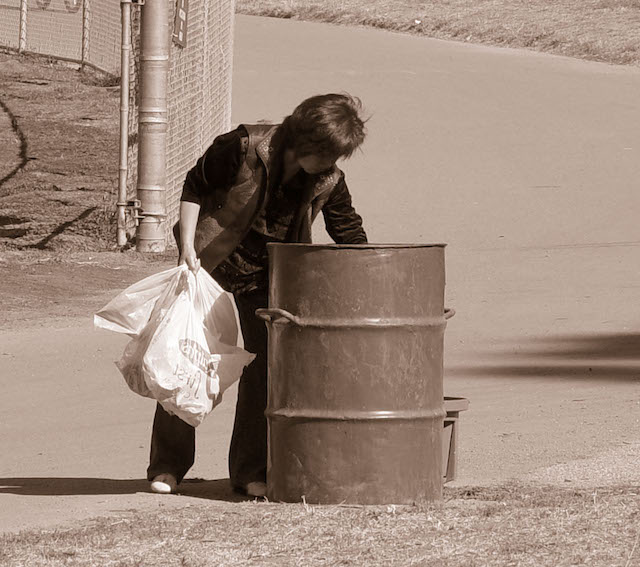
When my husband pulled into the rest area, I saw two older, Hispanic-looking women going through the commercial dumpsters. On the ground next to them were plastic bags partially filled with empty soft drink and beer cans.
The women looked tired and bedraggled. Sweaty.
“Oh my God, it’s over 100 degrees out there and they’re in the sun collecting empty cans from those dumpsters.”
The women looked older, like grandmothers. Maybe collecting empty soft drink and beer cans out of commercial dumpsters makes you look older than you are.
I leaned over to get my purse and saw nothing but a 20 dollar bill.
“Once again the ATM machine at the bank has provided me with an opportunity to be more generous than I might have been otherwise,” I note to myself.
“They’re not asking for money,” my husband said, but I didn’t care whether they were asking or not.
“If this 20 dollars goes missing from my purse,” I told him, “It will have a much smaller effect on me than the effect it will have on them if I give it to them.”
“Por dos?” the younger of the women asked me incredulously, which I took to mean that she was asking if it was true, that the money was for them.
“Por dos.” I told her.
The older of the two, the one with a bent back and the wrinkled skin, took my hand and kissed it.
“Gracias, senora. Gracias,” she said to me—me, who got into my car loaded with my husband’s cashmere sport coat and business clothes, an ice chest full of delicious food, two computers and a phone giving directions to an Airbnb located just a mile from the beach for a week’s worth of R & R in San Diego—me, who has never had to live so close to the bone as these two women in my whole 74 years.
I didn’t even know how much money the women would get for those stupid trash bags full of aluminum cans.
What I did know was that it probably wasn’t one tenth of one percent of what I would get from the dictation work from the law firm that would be waiting for me to transcribe on my computer when I got up in the morning.
What I did know was that I had never had so few means left but to crawl halfway into other people’s trash, other people’s dirty diapers, other people’s rotting food in hopes of finding enough aluminum cans to make it all worthwhile.
I pulled away from the rest area. The women waved. They smiled.
It was a mere 20 dollars.
I told my husband they were a good omen. I told him money was energy and we just gave them energy—and that in terms of energy, they gave us a lot more back.
As we drove about a mile away I saw the sign, “Border Patrol Inspection Ahead” and was struck by all the worlds that will have collided between the time I pulled off the road and saw the women collecting aluminum cans and the time I pulled into the Border Patrol Inspection Station.
“Where you folks from?” the guy would say.
“I’m from giving money away to two women down the road who are collecting aluminum cans to feed their families,” I pictured myself saying. “I’m from having more than I need and knowing that there’s enough to go around so I gave them some of it. I’m from no borders and no border patrol and from believing that the more you give away the more you get.”
But I didn’t get to say anything to the border patrol guy at all.
He just looked in the car, saw that I was white, and waved me on.
Years ago, I was at a meditation retreat when, during the dharma talk, one concept stuck out from among all the others.
“When you see a homeless person, or a person in need, or someone asking for money, don’t judge them,” the teacher was saying. “Don’t think, ‘Oh, they are going to spend the money on booze.’ Or, ‘They should get a job.’ Don’t think anything like that. It’s none of your business what they are going to do with the money. Your business is to learn compassion. That is why they are asking. That is why they are in need. To teach you loving-kindness.”
I’ve never forgotten the teacher’s words and have in fact found through the years, that giving in this way is liberating.
It liberates me from the weight of judgment—which is far heavier than many, many bags full of aluminum cans.
Author: Carmelene Siani
Image: Flickr/Franco Folini
Editor: Travis May










Read 0 comments and reply